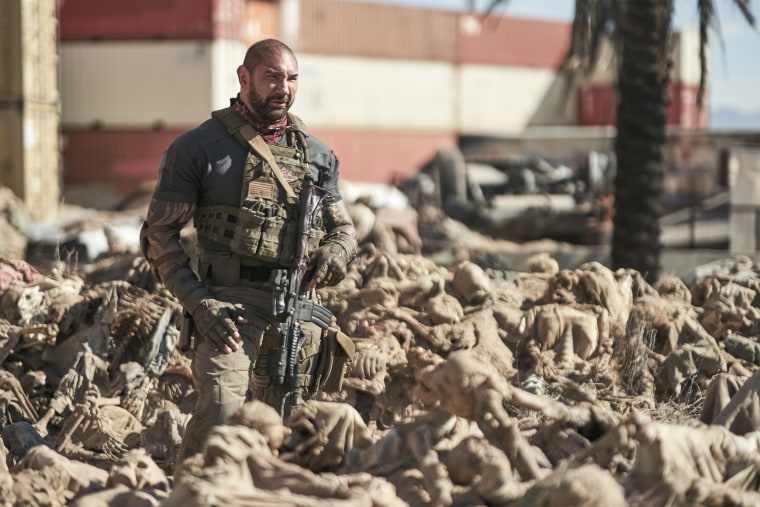Horror movies, especially zombie movies, usually succeed with audiences based on how accurately they depict whatever scares us at the moment. When "Dawn of the Dead" opened in 1978 — at the height of the disco era, amid high inflation that drove rapid consumption (and, soon after, the decade's second recession) — reviewers noted that it drew droll parallels between the zombies and the hedonistic survivors indulging their materialism in a shopping mall. When "28 Days Later" debuted in 2002, audiences that had seen tearful searches for survivors on the news after 9/11 saw an empty London plastered with fliers of missing persons.
Zack Snyder remade a more action-heavy "Dawn" for his first — and still best — feature film in 2004, amid continuing terrorist attack fears and the Iraq and Afghanistan wars. This weekend he returns to the zombie genre with his latest film, "Army of the Dead," but he seems less interested in finding new and interesting ways to scare us than in making sure every plot twist in his predictable screenplay lands with a maximum of fanfare. The result is a bit like a heavily concussed Christopher Nolan thriller.
"Army" is evidence that he doesn't know how to be a consistently interesting director but that he at least hopes one day to pull it off. It ends up being a curious pastiche of everything that audiences think is fun, just all at once: a casino heist movie, set in an infected city cordoned off by the military, which is overrun by zombies, where the protagonists are all antiheroes cracking wise, including Dave Bautista, Tig Notaro, Garrett Dillahunt and Matthias Schweighöfer.
It's not that the movie doesn't have any new ideas; it's just that it has only enough for a svelte 90-minute flick with about one-third of the ponderous dialogue of this one.
And Snyder has a good time following Bautista as he assembles that crew — an "Ocean's Eleven"-worth who are introduced using (or languishing without; there's a zombiepocalypse going on, after all) their trademark skills — after which their fixer (Nora Arnezeder) leads them into the depths of the abandoned city of Las Vegas.
But unfortunately, unlike the better "Oceans" films, it's clear nearly from the outset who's secretly working for whom, who will show up at the last minute and who will end up getting rescued. As a consequence, the film has the odd distinction of being a zombie movie that isn't particularly scary, and Snyder's best efforts to convince us we're having a good time rarely manage to do so. It's not that the movie doesn't have any new ideas; it's just that it has only enough for a svelte 90-minute flick with about one-third of the ponderous dialogue of this one — and the film clocks in at 2½ hours.
As with Snyder's 2009 superhero film, "Watchmen," the best part of his movie is its incredible opening credits sequence, which condenses an entire movie's worth of action and plot into a few minutes of the director's trademark tableaux — shocking sights like half-naked undead showgirls' snatching the toupee off a soon-to-be-eaten Elvis impersonator and a paratrooper descending screaming into a horde of the undead behind a hail of his own ineffective bullets.
The film is as long as any four episodes of "The Mandalorian," with the energy and pacing of about half of one.
But the inventive moments in the movie proper are a lot fewer and farther between, and the scenes of dialogue and negotiation that take us from one to the next are both wooden and highly predictable. If you've seen some of the smarter zombie movies of the last few years, you, too, will probably find yourself hungry for brains.
The best part of "Army of the Dead" is its world-building: These zombies are people, too — sort of — and their burgeoning culture is fascinating. What kind of lives do they want for themselves? What new and interesting people will they eat? The leader, a shambling horror in a cape and a bulletproof mask, is enigmatic and calculating in a way that flesh-eating monsters in other movies generally aren't. (I'll admit to enjoying the undead tiger, as well.)
But with this, Snyder put himself in strange territory. There are camps of people quarantined for potential infection, much like our own ICE detention centers; one especially mean bully of a guard is an obvious stand-in for all the abuses we've read about at those facilities. Sometimes the director seems to be queasily equating coronavirus lockdown with ICE detention. But does that make the zombies themselves essentially the undocumented people we're abusing in detention, or are the zombies us, with the coronavirus?
Either is enough to make a guy root for the zombies — which Snyder doesn't quite encourage us to do, though he comes close. (That's a movie I'd watch; for one thing, the zombies' dialogue is better.)
But the film is as long as any four episodes of "The Mandalorian," with the energy and pacing of about half of one. It's a weird flex to cram an entire fun-looking movie into just the credits and then shrug off the rest of your vast running time. Snyder, who is his own director of photography on "Army of the Dead," makes some beautiful moving images, but he doesn't really make something you could call a movie here. The spotty quality of the finished product is hard to sum up neatly, but if I may quote this film's most eloquent character: "Bleeeeeeaaaaaaaaarrrrgggghh."


